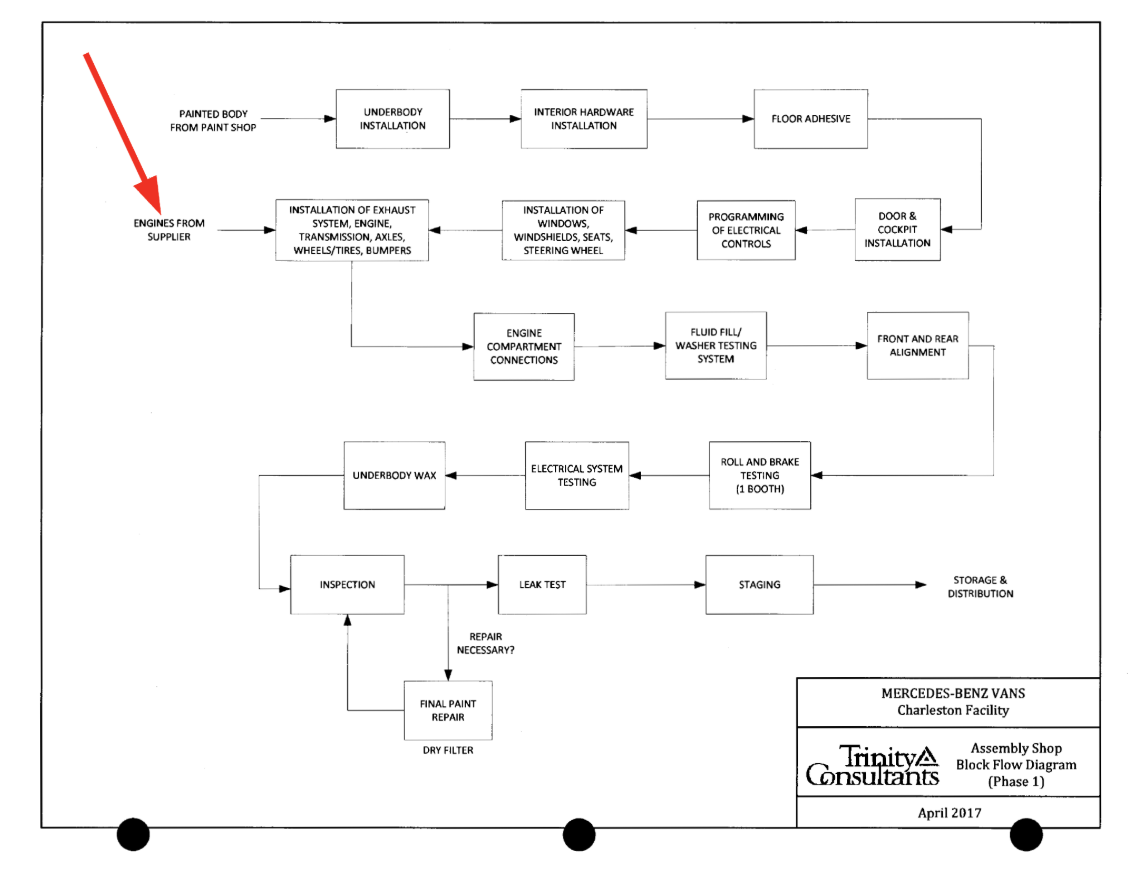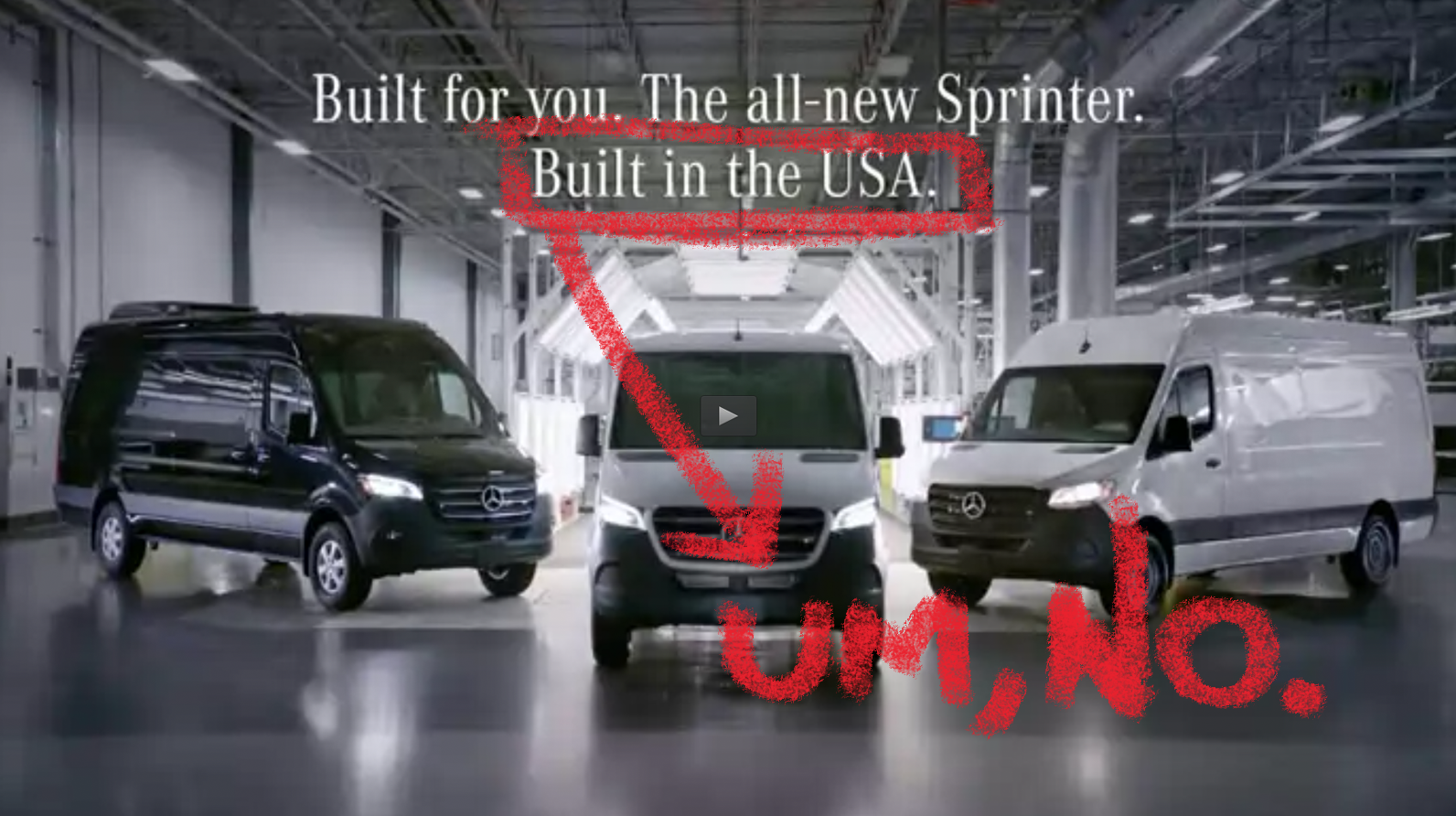Mercedes-Benz Forced To Stop Saying The Sprinter Van Was 'Built In The USA' Because It Really Isn't
Even though we tend to think of Mercedes-Benz as exclusively a premium brand here in America, its (well, via their parent company, Diamler-Benz) also a huge manufacturer of commercial vehicles, and that includes the very successful Sprinter vans used all over the world. Mercedes has a factory to produce these vans in Charleston, SC, which would make it seem like its building vans right here in America, right? Well, according to a truth in advertising group, not really.
That truth in advertising group goes by the cryptic name Truth in Advertising, Inc. and its recently called out Mercedes-Benz for claims that its building Sprinter vans in America.
Mercedes has had the Charleston plant for a few years now, and was initially using it to re-assemble Sprinter vans that had been built in Germany and then disassembled, all in a complicated and faintly ridiculous but effective scheme to get around America's 25 percent "Chicken Tax" on foreign cargo vehicles.
While the plant was assembling vans, the workers weren't really building them, since they were just re-joining the bodies to the chassis (which had to come to the U.S. on separate boats) and the only locally-sourced part was the battery.
Last year, though, Mercedes pumped $500 million into the factory, and it seemed like more manufacturing would be done at the plant, beyond just re-assembling German vans after shipping.
Mercedes played this up, marketing the vans as "Built in the USA" in their advertising.
According to Truth in Advertising (TINA) executive director Bonnie Patten,
"Mercedes-Benz engineered an entire marketing campaign on the false premise that its Sprinter van was 'built in the USA. While the changes Mercedes-Benz made are welcome, there's no question consumers were misled by the automaker's deceptive marketing."
TINA's research suggested that the Sprinter vans did not meet the Federal Trade Commissions's standards for a product that can be said to be"built" or "made" in America, and issued a letter to Mercedes-Benz, effective threatening to tell on them to governmental agencies and the public unless it made changes to their marketing. From that letter:
"Specifically, MB Vans is claiming – on national television, its website, social media platforms, Internet ads, radio commercials, and to the press – that its 2019 Sprinter is Built in the USA despite the fact that 90% of a 2,390 sampling of 2019 Sprinter vans offered for sale online by U.S. Mercedes-Benz dealerships are imported from Germany, according to origin information obtained from each vehicle's unique Vehicle Identification Number (VIN).
Further, upon information and belief, the 2019 Sprinters assembled at Mercedes-Benz's South Carolina plant contain significant non-U.S. components and do not meet the Federal Trade Commission's unqualified made in USA marketing standard. (To be clear, the FTC views the marketing claim "Built in the USA" as synonymous with "Made in the USA" and thus only allows such an unqualified origin claim when the promoted product is "all or virtually all" made in the U.S., meaning that "all significant parts and processing that go into the product must be of U.S. origin" and that the product contains "no – or negligible – foreign content."
The way TINA determined that the vans were German in origin involved a bit of VIN codebreaking. TINA's website describes the process:
To unlock country of origin information for the 2019 Sprinter, TINA.org examined the unique 17-digit vehicle identification number (VIN) of each of the 2,390 vans in our sampling, obtained from the individual U.S. Mercedes-Benz dealership sites. Specifically, TINA.org looked at the eleventh character in the sequence, which gives the plant where the VIN was stamped on the completed vehicle, i.e., the location of final assembly. Using the National Highway Traffic Safety Administration's VIN Decoder, TINA.org found that 90 percent of the vans had a plant code of either "P" or "N" for Düsseldorf or Ludwigsfelde, Germany, respectively, while only 10 percent had a plant code of "T" for South Carolina.
A flowchart obtained by TINA for the manufacturing process at the factory seems to support the idea that major components, including the engines and drivetrain, come from outside the factory. It's not clear if the bodies are stamped locally, or are imported as well:

For their part, Mercedes-Benz agreed to stop using the "Built in USA" statement in their marketing, and, "without prejudice or any admission of liability," agreed to alter all of the Sprinter's marketing content to remove any mention that the vans are "built in the USA."
It also said that "We appreciate TINA's efforts to alert MBUSA of its concerns," a statement that I sort of doubt.
I've reached out to Mercedes-Benz to find out exactly how much of the Sprinter vans are actually built in the Charleston plant, or if it's just still re-assembling German vans as before. I'll update when I get a response.
